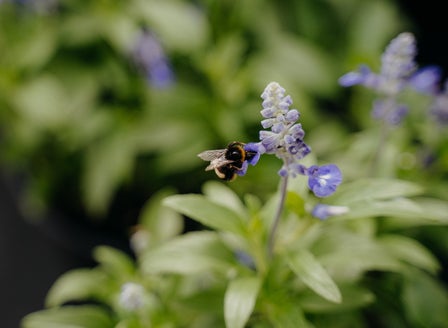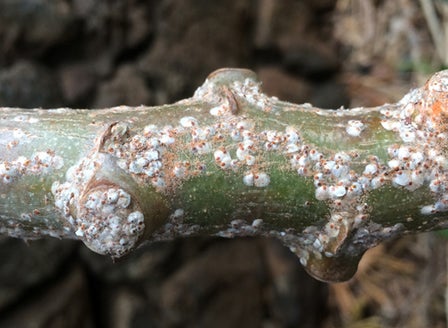Hebe is New Zealand’s largest genus of flowering plants, with over 100 species and varieties, available in a range of forms and flower colours. They are a hardy shrub, great for borders, containers, hedges, and of course, native gardens.
Planting Calendar
Hebes can be planted all year round.
Prepare
Position
Hebes are best grown in a sunny position where they get a minimum of 6 hours of full sun, although they will tolerate a small amount of filtered shade. Hebes prefer plenty of air movement.
Soil
When planted into the ground Hebes likes a free draining soil that is rich in organic matter. To improve the organic content in your soil, break up the soil and add Kings Compost and Kings Sheep Pellets then mix together well. When growing in containers, plant into Kings Container mix. This mix contains added water storage crystals and Saturaid, two products that help maintain moisture in the soil.
Plant
Gently tap the plant out of its pot. Dig a hole twice the size of the root ball. Back fill the hole mixing in Kings Compost and Sheep Pellets into your soil, so that the top of the plant's roots are level with the surrounding soil. Firm the soil down gently and water in well with Aquaticus Garden Booster. In heavier clay soils, where drainage is likely to be an issue, plant into a slight mound and sprinkle Gypsum Clay Breaker into the bottom of the hole, to help slowly condition the soil.
Care
Watering
Watering is essential especially in the first year of planting to allow the roots to get well established. Water slowly allowing the water to sink down into the roots, rather than allowing it to run off the top of the soils surface. Add Saturaid into the soil at planting as this will help channel the water deep down into the root zone. Consider setting up an automatic watering system – these can be simple and inexpensive.
Feeding
When planted in the ground liquid feed every month with Aquaticus Garden Booster, from Spring through to the end of Autumn, this encourages root growth and increases the microbial activity in the soil. Monthly applications of Kings Sheep Pellets will help with soil conditioning and plant health. If planted into a container, feed with Kings Liquid Fast Food along with monthly applications of Aquaticus Organic Garden Booster this encourages strong roots and a healthy immune system.
Protecting
Protect Hebes from frosts in the winter by covering with frost cloth.
Mulching
Mulch around the base of the plants (make sure that the mulch does not come into direct contact with the stem of the plant) with Living Earth More than Mulch. Mulching helps to reduce weeds as well as aiding the soil to retain moisture.
Spraying
Hebe can be prone to attack by scale insect. Ants are a sure sign that scale are on the plants. Spray with Aquaticus Bugtrol.
Pruning
Remove spent flowers to encourage new buds to from.
General Care
When using sprays, chemicals or fertilisers always read the label and follow the instructions. Apply sprays in the evening to avoid harming beneficial insects.
Expert Tip
Trim hebes back by up to a half after flowering to encourage new growth and create a bushy plant
Top Varieties
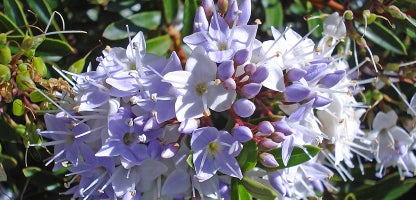
Diosmifolia
Great a low formal clipped hedge. Small dark green leaves with white flowers produced over a long period through spring. Grows 70cm
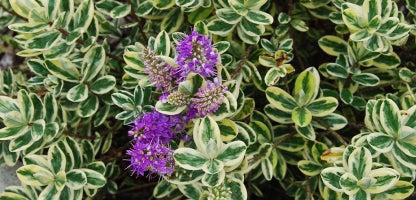
Waireka
A variegated foliage version with light purple flowers Compact shape grows to up to 1m in height
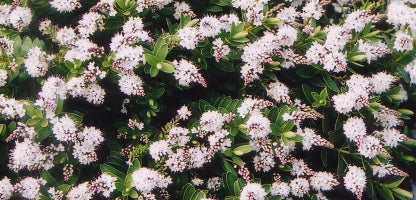
Wiri Mist
Compact and spreading 45-60 cm in height Brilliant Green foliage with White flowers.
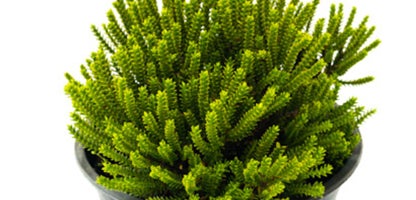
Emerald Green
Dark Green Textural almost Topiary like foliage With White flowers, small compact habit grows 30-45 cm in height. Great for a low hedge or border.
Frequently Asked Questions
What are Hebes?
Hebes are a diverse group of evergreen shrubs native to New Zealand. They are known for their attractive foliage and vibrant flowers, which come in various colours like white, pink, purple, and blue.
When is the best time to plant Hebes?
The best time to plant Hebes is during the cooler months of autumn or early spring. This allows the plant to establish roots before the heat of summer.
How often should I water Hebes?
Watering is essential especially in the first year of planting to allow the roots to get well established. Water slowly allowing the water to sink down into the roots, rather than allowing it to run off the top of the soils surface. Add Saturaid into the soil at planting as this will help channel the water deep down into the root zone. Consider setting up an automatic watering system – these can be simple and inexpensive.
Do Hebes require pruning?
Remove spent flowers to encourage new buds to from.
How do I fertilise Hebes?
When planted in the ground liquid feed every month with Aquaticus Garden Booster, from Spring through to the end of Autumn, this encourages root growth and increases the microbial activity in the soil. Monthly applications of Kings Sheep Pellets will help with soil conditioning and plant health.
